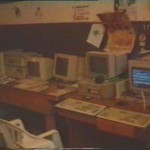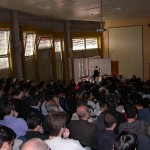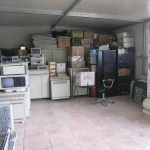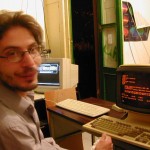Storia
Museo dell’Informatica Funzionante start in 1994 from an idea by Gabriele “asbesto” Zaverio, initially just like an old computer collection, just to revive them and, after a while, it became argument of more complex studies inside the Freaknet Medialab, revolutionary computer lab hosted by the “Centro Sociale Auro” squat in Catania. Thanks to the efforts of Dyne.org and Poetry Hacklab hackers, now this simple idea transformed in a real Museum.
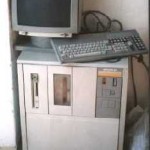 All our efforts were made in total disinterest and without any kind of help from local authorities, that literally ignore our work.
All our efforts were made in total disinterest and without any kind of help from local authorities, that literally ignore our work.Everything we do is made only by volunteer work..
In 1998 we created in Catania the first Free Laboratory in Italy to provide free and open access to its network of computers, connected to the Internet, built by recycling old hardware; with this network we provided for free to anyone a login shell and an email on UNIX and GNU/Linux systems to non-EU immigrants, homeless people, travelers, but also students and local families.
We held open courses, affordable and accessible to anyone; we organized workshops and conferences on a wide variety topics such as computer security, programming, history of computing, freedom of information, art and more, in schools, colleges and universities throughout Italy.
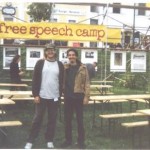 We have been invited to give workshops and conferences in different parts of the world; we have dealt with several national media (RAI 1, RAI 2, RAI 3, Canale 5, Rete 4, Tele Montecarlo, Rai Radio3, Telepiù 2 ‘).
We have been invited to give workshops and conferences in different parts of the world; we have dealt with several national media (RAI 1, RAI 2, RAI 3, Canale 5, Rete 4, Tele Montecarlo, Rai Radio3, Telepiù 2 ‘).We have developed and implemented cultural projects in India, Palestine, Iraq, Indonesia, Austria, Germany, the Netherlands; one of our programmers / system analysts has just completed a collaboration with the University of UNATEK Kibungo and the Association “Twese Hamwe”, in Rwanda.
We often receive visitors from all over the world but, for those who cannot physically come and visit us, we have put online some historical computers, which can be reached 24/7 and can be accessed freely by everyone; you can also request a personal access. They have a lot of daily login from all over the world! Operating systems available on computers online include VMS, IRIX, UNIX System V Rel 3, RT-11, AIX, Solaris, MV / OS and others, on platforms like Digital VAX and PDP-11, Sun Microsystems, Silicon Graphics, IBM RS / 6000, Data General, etc.; there are many programming languages available, including FORTRAN 77, ALGOL, ADA, LISP, COBOL, PASCAL. There is also a collection of programs and historical games, compiled directly from the original source code of the early ’70s, like StarTrek, MORIA, Nethack, ADVENTURE, COLOSSAL CAVE and more!

